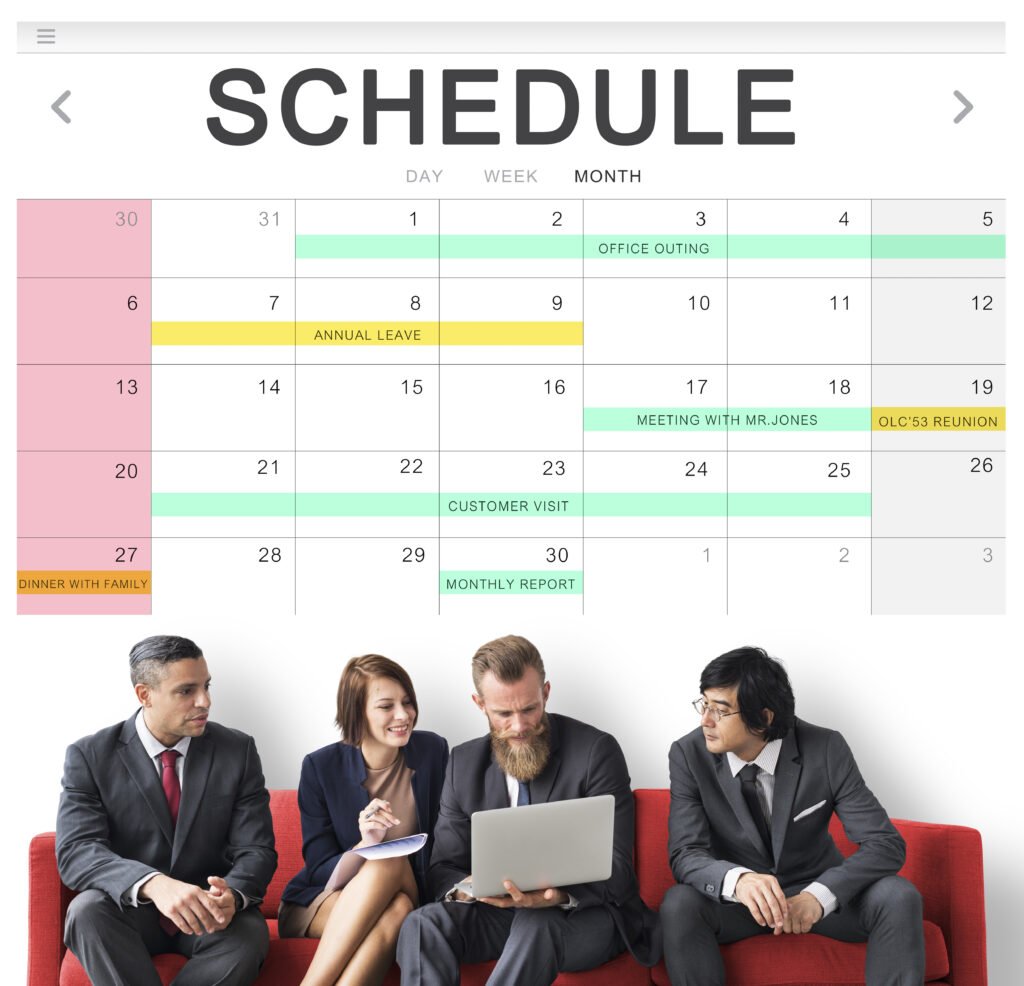Great stress on the day of the deadline. How recognizable! The tension among your employees can be cut and there have already been several personal conflicts . At the same time, you realize that in this final phase, unnecessary errors are being made due to increasing pressure. Errors that you as a manager will soon see on your plate. This deadline stress seems to belong and is therefore often taken for granted.
But did you know that this stress and the resulting errors can easily be prevented? Discover in this blog how you as a manager can play a key role in stress-free deadlines.
Deadlines – a source of a lot of work stress
How come deadlines often go hand in hand with stress? One of the reasons is a tendency that is very human: procrastination. As long as you postpone something, you tell yourself that there is no reason to start something. After all, you are perfectly on schedule! But of course, you are fooling yourself. It is pure ostrich policy; we don’t want to face a reality. As the deadline approaches, the feeling of tension and stress increases proportionally or often exponentially.
“I perform better when I’m under pressure,” you sometimes hear. But people who are stressed rarely keep a cool head. And in a panic or stress situation, you should not normally expect better performance, certainly not in a group. This also applies to your company. A stressed atmosphere will contribute to conflicts between employees, absenteeism due to burnout and stress-related errors. You as a supervisor will have to put out the fires, compensate for sick leave and correct the mistakes. So even more stress!
Also read: Stress signals from an employee

The benefits of stress-free deadlines
Fewer mistakes A stress-free deadline means fewer mistakes. Your employees have time to think about their decisions and are not distracted by stress or panic. Panic football rarely leads to good results. And not too good football either. If employees continue to work together concentrated on the deadline to complete the project, the chance of a good result is greater.
Less absenteeism Many employees are under great pressure. One in seven Dutch people has to deal with burnout. That’s because life often demands a lot from someone. Of course, you want to limit absenteeism at work by keeping working conditions as good as possible. Stress is something that you will want to avoid. If you allow the stress to increase as you approach a deadline, you might give your employees that extra amount of stress that they can no longer handle.
More job satisfaction An employee who enjoys going to work is often a productive employee. Work conflicts are disastrous for a good working atmosphere . People who are under pressure react earlier with annoyance and say things that they regret afterwards. In such a situation an argument quickly arises. Sometimes it is something small, but the consequences can be huge: mistakes, tensions and no longer wanting to work together. The opposite is also true: a team that works well together performs better. Why? Because the working atmosphere is good. Don’t jeopardize a good working atmosphere due to unnecessary stress.
Also read: increase work pleasure
Is a deadline without stress feasible?
Deadline related stress is so recognizable that you would almost wonder if it is possible to meet a deadline without stress and pressure. But know this: a stress-free deadline is feasible. No stress! It requires a good approach and some extra investment from you as a manager, but the results justify this extra effort. Quickly see which 7 tips can help you.
Also read: set a good example as a manager
Tip 1. Realism
You set many deadlines yourself, whether or not in consultation with your client. The tendency may be to agree on a date that is very optimistic. Maybe with the idea: we can, we go for it! Of course, it is good to have faith in your employees, but realism is also important. Make a good estimate of the content and scope of the project and the production capacity of your team.
You may not have anything to say about other deadlines. But even then, realism is a good start. First, make a realistic estimate of the size of the project. Then see if you have enough manpower in your team to complete the project within the agreed time. It may be necessary to free up a few extra employees or to scale up your production capacity in another way. Make a realistic schedule based on that.
Tip 2. Good preparation
A good start is half the work. This also applies to setting up and managing larger projects. Make a good picture of what is being asked and how you will achieve it. What and who do you need? It often turns out later in a project that certain information is missing or that expectations have to be adjusted. Prevent this kind of setbacks by investing extra time in good preparation.
Make sure you develop a good step-by-step plan based on all the information and put the puppets in the right place. They all seem open doors, but projects often fail because not enough time is put into proper preparation. The first steps provide a stable basis for a successful project.
Tip 3. Communication
Now that you know how the project will proceed and who should do what, you must clearly communicate this to your employees. Clarity is important. Many managers make the mistake of broadly explaining what needs to be done. Often this is via an unclear mail or in a vague meeting. The manager thinks that he has clearly stated what needs to be done, but the employees are left with questions. Who should do what? And how? And when? Where can you find information? Make sure there is no doubt about someone’s duties. Employees become unproductive when they do not know exactly what is expected. A waste of precious time. If it makes sense, provide a project schedule with the flow of the project, so that everyone knows what their role is in the big picture.
Read also about an island culture
Tip 4. Time management
This is an important aspect of a stress-free deadline. With good time management , it will not arrive on the last days before the deadline. Each sub-part of the project is given an end date so that you will not be faced with any surprises at the end of the project.
Time management is also important when it comes to various tasks that must be ready at the same time to start the next task. This prevents the project from unnecessarily stalling.
If you have your time management in good order, the workload will be spread over the entire project. Time could even be scheduled for short moments of relaxation. An employee who feels that he is working on a schedule will experience less stress. And a supervisor who sees that a project runs smoothly can sleep peacefully.
Read on about: time management

Tip 5. Pre-deadline
Sometimes a pre-deadline can build in the necessary rest. It often turns out on the day of the deadline that all sorts of things still have to be adjusted because mistakes have been made. These are potential stress moments. A pre-deadline can help you and your team to put the finishing touches in peace and, if necessary, to correct errors, while you are already starting a new project as a department.
Tip 6. Task lists
People like to check off a task. They even make them happy. That applies in daily life, but also at work. A task list provides clarity and tranquillity. Nobody has to wonder what needs to happen because the list speaks for itself. You can add tasks, organize tasks and of course assign tasks. Don’t forget to divide large tasks into smaller subtasks. Tip: add a number of small tasks, because it is very satisfying to tick off a task. So a to-do list is not only useful, but it is also very nice. The only thing is: you have to make those lists.
Tip 7. Good balance
Balance is important in everything. Suppose your employees don’t always achieve their goals because those goals are unrealistic. Or that they get way too much time for a simple task. Both situations are undesirable. Ensure a good balance between production and good atmosphere. You will see that with good planning, more is done than you think in advance. At the same time, be flexible if you notice that the project is faster or slower than estimated. A balance between working without stress and productivity will ultimately have the best results.
Also read: the relationship between corporate culture and absenteeism
Set a deadline!
Many managers run behind the facts. One project is not yet ready or the next one is already coming. As a result, they often throw themselves into a new project without much preparation. The result is clear: no overview, no clarity, no time management – in short, no successful project. And usually a lot of stress around the deadline. It is essential that this habit is broken. If you do that, you will be able to achieve more with your team, make fewer mistakes and experience less absenteeism. Set the first stress-free deadline for yourself: start the next project well, no matter what.






